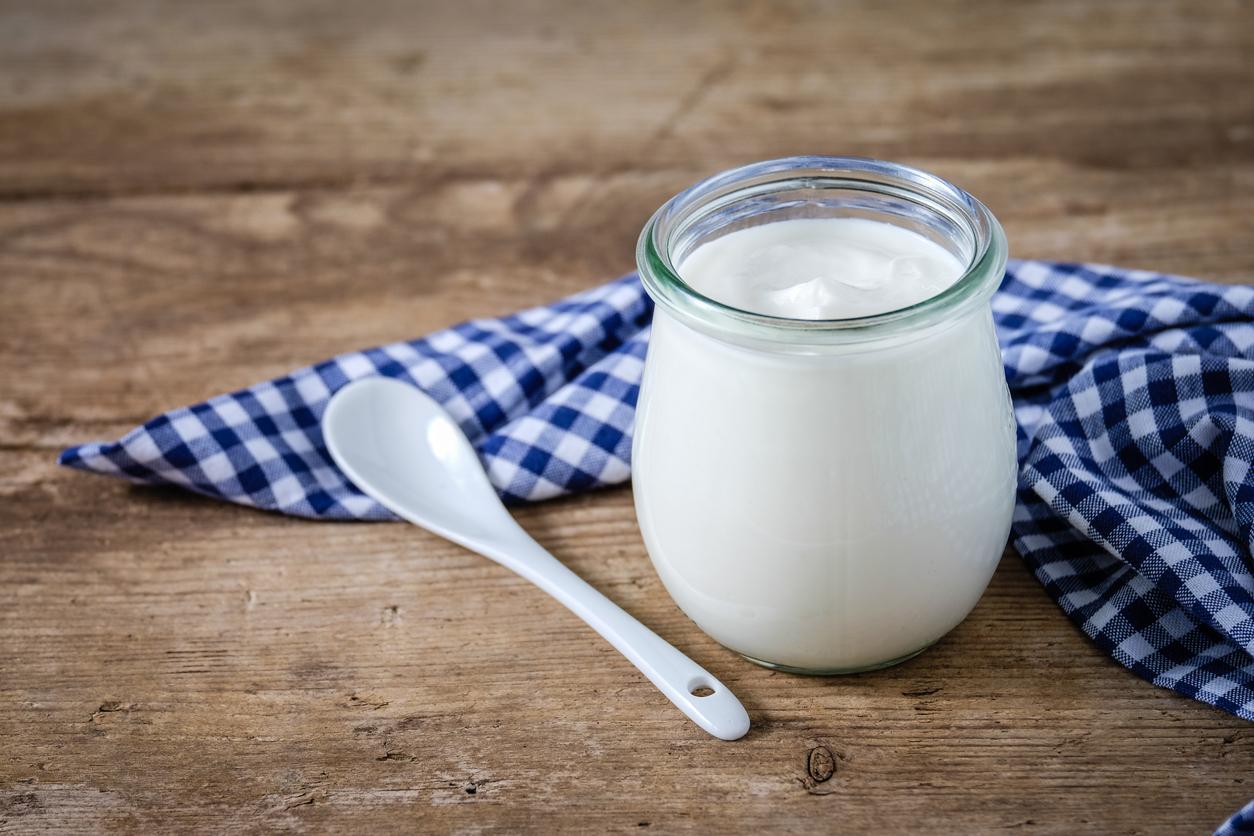The man transforms the milk into yogurt, which can be kept longer, since probably seven or eight centuries BC. Long before, therefore, that Louis Pasteur discovered the micro-organisms that allow fermentation!
Gentle on the tummy
The bacteria present in yogurt are beneficial for the intestine and its intestinal flora – the microbiota -: an asset for people suffering from chronic constipation. Better still, these good bacteria would relieve irritable bowel syndrome and diarrhoea, particularly in children, by reducing both their intensity and their duration, whether infectious or linked to the consumption ofantibiotics. Participating in the digestion of lactose (the main sugar in milk), the bacteria in yogurt even allow certain intolerant people to tolerate it better, without digestive problems.
Read also: Diet: 4 misconceptions about yogurts
Probiotics, a slimming ally?
Cap on a serene mood
Yogurt provides a good dose of tryptophan, an amino acid which is also the precursor of the essential serotonin, which notably regulates mood. Not produced by the body, this tryptophan must be provided by food, it also supports physical endurance, sleep, relieves anxiety and depression. A lack could promote irritability and aggressiveness. In addition, yogurt also provides group B vitamins (which maintain the nervous system). It has also been established that its probiotics, these good bacteria in yoghurt, would also have a direct effect on the state of stress and mood, via the microbiota. If studies are still in progress, it seems that certain strains of probiotics, in particular the lactobacilli contained in yogurt, can improve certain disorders, even “psy” diseases, even if the specialists remain cautious. A study carried out in volunteers who were not sick or depressed, however, showed that those consuming probiotic yogurts noted an improvement in their mood.
A real sweetness
If it does not make you lose weight, as we have sometimes heard, thanks to its richness in calcium, yogurt is an interesting food for people watching their weight, because its glycemic index remains low (35 for a plain yogurt), and its satiating power is quite high thanks to its good protein content (almost 7 g in a jar). Some studies tend to show that the consumption of yoghurt (220 g per day) would keep the Type 2 diabetes, but they are not unanimous and need to be clearly confirmed. However, there is no point in abusing it and consuming it at every meal: one or two yogurts a day are more than enough if the rest of thediet is balanced, rich in vegetables and animal and vegetable proteins. Still, it is very pleasant to eat: in the elderly, sick and/or malnourished, it may be particularly advantageous to easily increase the protein and calorie intake in this way and to avoid weight loss and muscle wasting.
Its health benefits
• Promotes digestion. His probiotics, good live bacteria, will nourish the intestinal flora, the balance of which is essential for digestion. It would even relieve the diarrhea, especially children.
• Anti stress. Rich in tryptophan, it thus facilitates the production of serotonin, the neurotransmitter of sleep and mood.
• Balance. Its good dose of proteins, associated with a low glycemic index, makes it a recommended food, because it is nutritious for children (it provides calcium), but also for the elderly, who risk muscle wasting, and for sick people.
What is real yogurt?
In the dairy section, there is something to get lost in…and often, we hear products that are absolutely not yoghurt called yoghurt, such as cottage cheeses, petit-suisses or even dessert creams! A “real” yogurt is made with milk (whole or partially skimmed) and lactic ferments (lactobacillus bulgaricus and streptococcus thermophilus) which allow it to “set”, period. The bacteria must remain alive in the finished product, at a dose of at least 10 million bacteria per gram of yoghurt. It is always necessary to buy it as basic as possible. We can recommend the brews as well as the whole milk yogurts in glass jars, but neither flavored nor sweetened, nor added anything! Otherwise, these products quickly become very sweet little calorie bombs, even if they are “sold” as containing 0% fat (which is of no interest from a nutritional point of view) and they must, like dairy desserts, Viennese and other sweets, remain exceptional.
His CV. 71.8 Cal/100g (from plain yogurt) • Fat 2.57g • Carbohydrates 7.38g • Protein 4.12g • Fiber 0g
Read also:
Yoghurts: they are still good 3 weeks after the date
To have a nice flat stomach, bet on yogurts!
Yogurt, a new remedy for hypertension

















